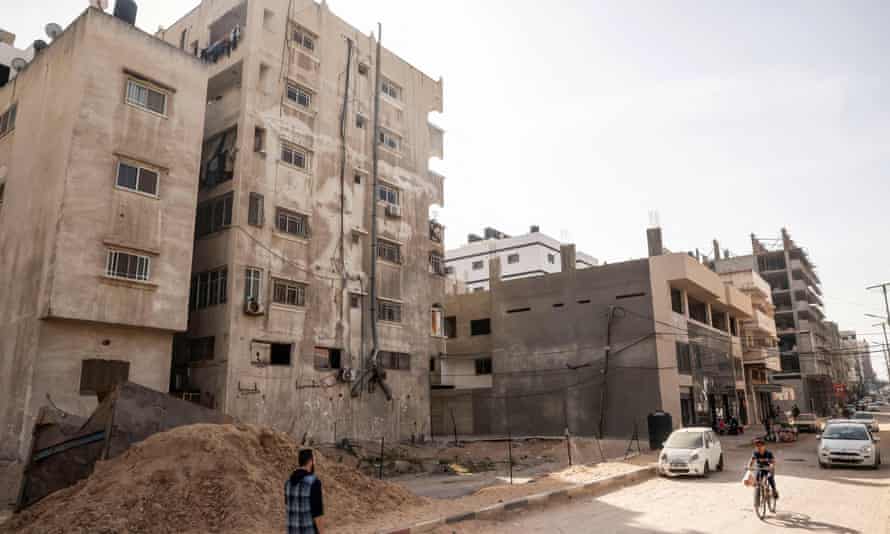The Cold Has Trapped Us Inside Again and I an Grown This Is How I Spent My Day
O mar Abu al-Ouf is revising for his final schoolhouse exams, hoping to do well plenty to pursue his dream of condign an engineer, but it's hard for the 17-year-former to focus. His mind constantly drifts to his family, all of whom died last yr when an Israeli airstrike destroyed their apartment edifice in a middle-class neighbourhood of Gaza city.
"Information technology's like he goes somewhere else," said his grandmother, Manar, in the living room of the boy's uncle's house, where he at present lives. "His whole family unit is gone, for nothing."
Ouf spent 12 hours under the collapsed building, his arm around the trunk of his 12-year-old sister, Tala. His blood brother Tawfik, 17, remained live for several hours; they talked to each other in the darkness, choking on rubble grit. Tawfik told him that their female parent, Reem, was expressionless; before rescue teams could reach them, Tawfik too died from his injuries. Their father, Ayman, an internal medicine specialist at Gaza'due south main hospital, was besides killed in the attack.
The eleven-day disharmonize final May between Israel and Hamas, the Palestinian militant group that controls the Gaza Strip, left Ouf totally alone. A yr on, the teenager all the same suffers from nervus issues in his correct arm and leg. He is trying to rebuild his life, he said, but still can't make sense of what happened.
"Ramadan and Eid this year were very hard. I miss them every day. I didn't recall my life would exist like this," he said. "I don't go out much. Sometimes my friends come see me here, but we have all got to report now. The only hobby I have since the incident is crying."
Ouf is now living with his uncle's family unit, not far from his former home on al-Wehda Street, a busy thoroughfare filled with apartment blocks, shops and cafes where 44 people were killed in the Israeli strike on 16 May last year. The attack was the single deadliest incident in the conflict, which left 256 Palestinians in Gaza and 14 people in Israel dead.
The Israel Defence Forces said the civilian deaths on Wedha Street were "unintended", caused past the plummet of the hole-and-corner foundations of a targeted Hamas military structure which brought down the housing blocks on the street higher up. Rights groups such equally Amnesty International have said that the incident may plant a war offense.

A twelvemonth afterward, just 5% of the 1,000 housing units, roads and other infrastructure destroyed past the bombardment of the Gaza Strip have been rebuilt, co-ordinate to the Hamas housing ministry building.
Much United nations and other funding from external donors is often held up in lengthy diplomatic talks or impeded by the Israeli and Egyptian authorities, which have blockaded the area since the Islamist grouping seized control in 2007. The de facto siege has led to a collapsed healthcare system, poisoned Gaza's h2o, and leaves the small-scale area's two one thousand thousand inhabitants struggling to cope with rolling power cuts.
The rubble from the last circular of fighting may have been cleared, but gaping holes and sandy lots strewn with rubbish remain, a daily reminder of the lives and homes lost. On a poster hanging opposite Ouf's destroyed home, the faces of three children killed in the concluding circular of hostilities, in 2014, as well peer downwardly on passers-by.
Tensions between Hamas and Israel are on the rise again. The militant group's leaders take praised a recent spate of terrorist attacks targeting Israelis that have left nineteen people dead, and urged Palestinian citizens of Israel and those living in the occupied West Bank to carry out more attacks. Hamas has also threatened some other all-out war if recent clashes at Jerusalem's Aqsa mosque compound keep.
In response, Israeli officials take reportedly relayed a alarm to Yahya Sinwar, Hamas' height leader inside Gaza, that his latest speeches inciting terrorism give Israel the freedom to respond militarily.
State of israel closed the simply frontier crossing to most of the 12,000 Palestinians in Gaza with permission to work outside for ii weeks, and Israeli media have reported that the government is considering restricting their numbers in futurity.
The loss of income has added to the daily misery in a place where a whole generation has now grown up trapped in the overcrowded, polluted littoral enclave: unemployment in Gaza is running at about fifty%, and workers commuting to Israel are worried that they volition no longer exist able to bring home $1.5m in collective earnings each twenty-four hour period.
Ouf, who has already lost everything, says he doesn't care if there is another war. He hopes to leave Gaza ane day – mayhap to written report abroad – only the future is too overwhelming to think about.
"Information technology'due south hard to limited all the things I feel," he said. "I was going to piece of work hard, celebrate my exam results, go to academy … I wanted to make my begetter proud of me. Just instead, I am alone."
Source: https://www.theguardian.com/world/2022/may/16/i-miss-them-every-day-the-boy-who-lost-his-whole-family-to-an-israeli-airstrike
0 Response to "The Cold Has Trapped Us Inside Again and I an Grown This Is How I Spent My Day"
Postar um comentário